
MSA Trust Members Magazine | Issue 66 | February 2023 Making
MSA
communication
your voice heard
Trust help with
Welcome to Issue 66
To start with we wanted to say a big thank you to everyone who completed one of our MSA Needs Survey questionnaires. Over 500 people responded which is fantastic and means we can better plan for our services and campaigning. Read more about this on page 11. We hope to publish the full results this summer.
This issue is jam-packed with articles we hope you’ll find interesting and informative. There’s a feature-length article from our Social Welfare Specialist, Sam about paying for care. This area can be complex and confusing with differing criteria around the UK and Ireland, so find out more on the next page.

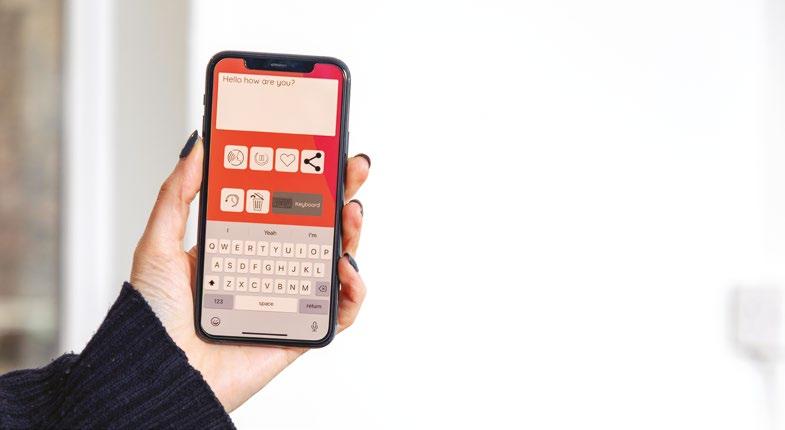
We also have articles about Voice Banking outlining how you can start now with funding from us, and pain management in MSA on page 6.
As always there are research and fundraising roundups, including event dates, keeping you all up to date.

We hope you enjoy reading this edition of MSA News and please do let us know any feedback you may have.
Emma and Andy
Registered Charity Number 1137652. Scottish Charity Number SC044635. Company Number 7302036 We endeavour to ensure the accuracy of articles in MSA News. Please note, however, that personal views and opinions expressed are not necessarily endorsed by the Trust. Designed by Base Media www.base-media.co.uk. Printed by INQ Design 020 7737 5775. CONTENTS 02 | msa news | Issue 66
Helloand a warm welcome to your first edition of MSA News in 2023.
VOICE BANKING - PAGE 16 Accessing and Paying for Care Tips for Managing Pain In Memory News Roundup Research Update Your Voices Heard Brain and Tissue Donation Fundraising Roundup Voice Banking – SpeakUnique and MSA Trust Funding Supporting and Helping Each Other Our Support Group Network 03 06 08 09 10 11 12 14 16 18 19 CHIEF EXECUTIVE OFFICER: Karen Walker MSA NEWS EDITORS: Emma Rushton Andy Barrick ALL ENQUIRIES TO OUR ADDRESS: Multiple System Atrophy Trust 51 St Olav’s Court City Business Centre, Lower Road London SE16 2XB Tel: 0333 323 4591 www.msatrust.org.uk
Accessing and Paying for Care at Home

Whether you are living with MSA or caring for someone with the condition, you may need some extra help and support to manage tasks such as washing, toileting, dressing, preparing a meal, shopping, or meeting up with friends. Here, Sam Fitzgerald, our Social Welfare Specialist, outlines how you might go about accessing and paying for such help.
Accessing Care
If you live at home and you are increasingly finding it difficult to look after yourself or need help with daily living tasks or social activities, talk to the Adult Social Care team at your local authority and request a care needs assessment. Everyone has a right to an assessment, free of charge, even if you end up paying for your care. A family member, friend or carer can request an assessment on your behalf and can be there to support you during the assessment. Given the current pressures on the social care system, it’s advisable to request an assessment early rather than waiting until care needs become more urgent. Care needs assessments don’t just look at the help
you need with personal tasks such washing, dressing, toilet needs, eating and drinking. The assessor should also ask you how you want to live your life and whether there are certain aims or goals you’d like to achieve, then discuss the help you may need to make them a reality. The assessment may also identify the need for support from other services such as an Occupational Therapist, to access equipment or adaptations to aid your independence.
Following the assessment, you should receive a written care plan. It should outline your assessed needs and suggest appropriate solutions to address those needs.
www.msatrust.org.uk | 03
SUPPORT FOR YOU FUNDING CARE
Paying for Care
England
Once you have an agreed care plan, your local authority must do a financial assessment. Most people have to contribute something towards the cost of their care. Income, including benefits and pensions, and savings are considered, but only for the person needing care – your partner’s income and savings cannot be considered. If you have joint savings, the local authority will assume you each own half of the total amount (unless you can show evidence to the contrary). If care is being provided at home, the value of your home is disregarded. The table below explains how savings affect the contribution you may be asked to make:
Savings over £23,250* You would be expected to pay for your care as a ‘self-funder’
Savings between £14,250 and £23,250*
Wales
As in England, following a care needs assessment, the local authority must do a financial assessment. In Wales there is a maximum weekly charge of £100 for homecare services. Income, including benefits and pensions, and savings are considered, but only for the person needing care. If you have joint savings, the local authority will assume you each own half of the total amount (unless you can show evidence to the contrary). Some types of income may be fully or partially disregarded e.g. income from employment (including self-employment) is fully disregarded. For homecare services, the value of your home is disregarded.
You would pay a contribution from your income plus a ‘tariff income’ based on your savings.
Tariff income = assumed income of £1 for every £250 (or part of)
In Wales, the savings threshold is £24,000 and any savings below this are fully disregarded. If you have savings in excess of £24,000, the local authority can charge the full homecare cost – up to a maximum of £100 per week.
Savings below £14,250*
*Based on 2022/23 figures
Savings below £14,250 are disregarded. You may pay a contribution from your income
After paying your contribution, your weekly income should not reduce below the Minimum Income Guarantee (MIG) – a certain level of income to cover living costs. This is a complex calculation depending on individual circumstances so call us for further information. Find out more about paying for care in England here -
www.msatrust.org.uk/link/payingforcare/en
Paying for homecare in Wales should not reduce your weekly income below the Minimum Income Amount (MIA). The MIA differs depending on various factors including any disability related expenditure you have. Find out more about paying for care in Wales here -
www.msatrust.org.uk/link/payingforcare/wales.
SUPPORT FOR YOU FUNDING CARE
04 | msa news | Issue 66
(this differs depending on where you live)
Scotland
In Scotland, following a care needs assessment, personal care and nursing care should be provided free of charge. There may be a charge for domestic support such as shopping, laundry or housework and charges vary depending on your local authority. Find out more about paying for care in Scotland herewww.msatrust.org.uk/ link/payingforcare/scot
Northern Ireland
You should contact your local Health and Social Care Trust to request a community care assessment. Care arranged by the Trust is not usually free so there will be a financial assessment once you have an agreed care plan. For more information visit -
www.msatrust.org.uk/link/payingforcare/ni.
Republic of Ireland
The Health Service Executive (HSE) Home Support Service aims to help you remain at home for as long as possible. Services can include additional home help hours, nursing services, therapy services, and other services which might be needed due to illness or disability - or after a stay in hospital or a nursing home. Any support received will be based on your assessed care needs. The Home Support Service is free and available to people aged 65 or over who may need support to continue living at home or to return home following a hospital stay. Some exceptions may be made for those under 65 who are living with a disability. You can find more information and download an application form here -
www.msatrust.org.uk/link/payingforcare/roi.
Support for Carers
Caring for a loved one or friend can be both rewarding and challenging. Often carers forget to look after their own health and wellbeing so; getting the right help and support can make a big difference. Carers are entitled to a free carer’s assessment from their local authority to determine what support they need. Support can include help with caring, a respite break, or equipment to make things easier. Local authorities usually charge for the services they provide, but they must carry out a financial assessment as you may be entitled to financial help towards the cost. Find out more about support for carers here -
www.msatrust.org.uk/link/supportforcarers. msa news
If you have any questions about anything in this article contact our Social Welfare Specialist, Sam, at sam.fitzgerald@msatrust.org.uk or 0203 404 6673
SUPPORT FOR YOU FUNDING CARE
www.msatrust.org.uk | 05
Making Sense of Pain in MSA

This article will focus on physical pain, though emotional, psychological and spiritual wellbeing can also significantly impact on our perception of physical pain.
Our ability to feel physical pain protects us from serious harm e.g. withdrawing from a hot or sharp object. It also alerts us that something in our body is damaged e.g. from a fall or due to internal causes requiring medical help.
Common causes of pain particularly related to MSA are due to:
• postural changes
• bladder problems
• bowel problems
• blood pressure variability
• neuropathic (nerve) pain.
These are outlined below with key notes to help manage pain effectively.
Postural
The function of our skeleton is to hold us up straight and allow our limbs to move. This relies on opposing complementary sets of muscles working together to keep everything symmetrical, in balance and to enable controlled co-
ordinated movement.
Probably the most common physical pain experienced by people with MSA is due to altered mobility resulting in falls and change to posture. MSA damage in the movement centres of the brain can result in ‘mis-interpretation’ by the brain of the positions the body should be in. For example, antecollis often occurs in MSAthe head and neck are constantly being pulled forward against their will. The movement centres in the brain are interpreting this as the proper ‘normal’ position the head should be in, when clearly this is not correct.
06 | msa news | Issue 66 SYMPTOMS PAIN MANAGEMENT
We will all experience pain of varying types and to varying degrees throughout our lives. MSA is not physically painful, however the changes caused by MSA can result in pain. Katie Rigg, MSA Nurse Specialist, outlines the different areas where pain may be experienced in MSA.
Other postural changes may occur e.g. body lean to one side or forward, feet or hands pulled inwards, a toe or finger extended rigidly. These postures can become fixed as constant muscle activation holds the particular body part in the abnormal position causing spasm and pain. This is known as dystonic posture and is potentially very painful.
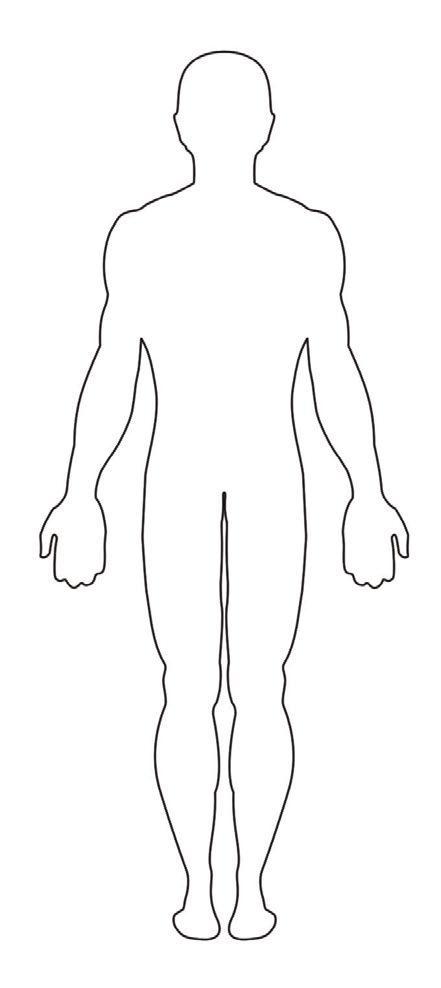
Bladder
A twitchy bladder and incomplete emptying can be a source of pain. Normally we feel discomfort in our bladder once it is holding about 400ml of urine alerting us of the need to go to the toilet. In MSA discomfort occurs if the bladder doesn’t empty completely or mis- messaging causes spasm in the bladder.
Bowel
Co-ordinated, constant muscular contraction of the bowels is controlled by the autonomic nerves, moving food through the gut and expulsion of waste from the body. If any part of this process is impaired pain can occur because of reflux or indigestion, bloat or wind, intense contractions, blockage or chronic constipation.
Blood pressure (BP)
Problems with fluctuating BP is often experienced in MSA. Low blood pressure reduces the blood flow to the large muscle groups of the upper arms, shoulder or neck girdle and upper legs or pelvic girdle. This is known as claudication pain and is the cause of coat hanger pain. Episodes of either low or high blood pressure can cause migraine type headaches. Moving from lying or sitting to standing can cause a
Pain Management
Good pain management requires good assessment. Identifying the origin and site of the pain, the type of pain, the severity of the pain and what makes it better or worse (e.g. lying down, moving around, touch, hot, cold etc.) will increase the chance of treating it effectively. This information will help your GP identify the best treatment options for the pain you have.
Treating the underlying cause using practical measures where possible, is likely to achieve the best pain relief. Any painkiller used needs to be appropriate for the type of pain experienced. Most painkillers slow bowel function so being aware of this is important. Objectively noting how bad the pain is and where it is before starting painkillers, and then making the same observations after taking a painkiller, can help clarify if they are helping and to what degree. Using the body outline and rating scale illustrated in this article can help you do this.
With good assessment, appropriate treatment and monitoring it would be hoped that most pains a person with MSA may experience can be improved.
msa news
sudden drop in BP which may result in falls and painful injury.
Neuropathic
Neuropathic pain occurs when there is an over excitability and mis-messaging between nerve endings in the body and the brain interpretation of these messages. Tingling, numbness, shooting, red hot poker pain or toothache like pain are classic descriptions of this sort of pain.
Please speak to your MSA Health Care Specialist for further information and support on pain and MSA. You can find the specialist for your area here - www.msatrust.org.uk/ support-for-you/hcps
www.msatrust.org.uk | 07 SYMPTOMS PAIN MANAGEMENT
Dr Anne Silk
Paul Hammond
Jane Elderton
Howard Cork
Paul Lukins
Bruce Hindmarch
Kenneth Matheson
Colin Portwain
David Heath
Thomas Bridge
Catherine Bowden
William Woodland
Jimmy Langwell
In Memory
Richard Thomlinson
Pauline Norbury
Edward Gilbert
Surjit Nagra
Karen Nicklin
Karen Bazalik-Smith
Marie Parsons
Sidney Coles
Mairtin O’Meara
Graham Nelson
David Edwards
Brian Holliday Gary Sills
Anne Kelly
Ian Draper
Colin O’Keefe
John Connaughton
Maureen Mookerjee
Peter Beeston-Taylor
Carole White
Margaret Meehan
Elizabeth Ormanroyd
Stephen Champion
Jennifer Willan
Francis Hubble
Peter Lunn
Leslie Hitchcock
Ian Webb
Jean Frickel
Sandra Gibbons
Margaret Boyle
Colin Akrill
Claire Aitken
Albert Hill
David Major
Terence Penn
Michael Forbes
Enid Miles
MARK HEARN MEMORIAL CYCLE RIDE
Mark Hearn was diagnosed with MSA in 2019. Unfortunately, this meant he had to take early retirement after 20 years at luxury watchmakers, Patek Philippe. He was an inspirational leader and a very supportive colleague, helping many of Patek Philippe’s employees build their careers in the watch industry.
Mark sadly passed away in 2021 and his colleagues wanted his legacy to continue. In September last year they organised the Mark Hearn Memorial Cycle Ride – a 1,000km cycling challenge over eight days. It started from the Patek Philippe’s UK head office, covered their London and Paris watch salons and ended at their headquarters in Geneva. Taken on by five of their watchmakers (Adam Dunbar, Beau Francis, James Hewitt, Patrik Zetterlund and Steve Parkinson)
who are avid cyclists themselves, this was a mammoth physically demanding challenge and involved cycling through different terrains. From the cobbled streets of Paris to the winding roads of the Jura Mountains, the cyclists continued on, motivated to see the finish line come what may! They said:
“We now want to keep our word to him, just as he unfalteringly did for each of us”
The challenge has raised over £42,000 - a truly staggering amount from dedicated colleagues making such a fantastic effort. We are grateful to all of the cyclists, their friends and family and of course, Patek Philippe. What an amazing tribute to a great man, Mark would have been so proud. msa news

REMEMBERING THOSE WHO WE HAVE LOVED AND LOST
IN MEMORIAM
08 | msa news | Issue 66
Increase donationyourvalue
NEWS ROUNDUP
Could you join our Trustee Board?
Did you know that any donations you make to us can often be increased at no extra cost to you through the Government’s Gift Aid scheme? We can claim an extra 25p for every £1 donation, provided you are a UK tax payer and pay at least equal to the amount we reclaim.
You can let us know your gift is eligible by signing a simple declaration when making offline donations (email fundraising@msatrust.org.uk to request a form) or just tick the Gift Aid box when donating online. Declarations are valid for five years, but you should let us know if your tax paying status changes to make you no longer eligible for Gift Aid.
msa news
New Carers Support
Take a look at page 19 for details about our new digital carers Support Groups. msa news
We are recruiting two new Trustees to join our Board. Trustees are volunteers who are responsible for our charity’s governance, ensuring we are managed and run effectively. One of these people needs either to have a finance background or a high-level of financial knowledge, or have research experience or background. We are also hoping to recruit someone living with MSA to the Board. To find out more about the Trustee role and what is required please email Karen, our CEO, at admin@msatrust.org.uk msa news

Our MSA Study Day in Wales
We were very pleased to hold a successful MSA Study Day in Cardiff in November. Over 90 healthcare professionals attended to learn more about MSA. We received great feedback with 100% of attendees saying that the day met their expectations, and that they now feel better able to support someone with MSA. Our next Study Day will be on the 19th October in Sheffield, so do ask your Health Care Professionals to save the date. A virtual attendance option will be available for the first time. msa news
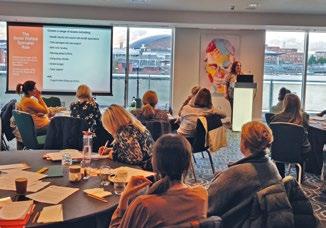
Audio books for FREE
It is now possible to listen to audio books for free from various sources.

Your local library has a plethora of audio books and eBooks to borrow which can be accessed using their BorrowBox app.
Join your local library if you are not already a member, download the app to your phone or tablet, select your library service, activate with your membership, then borrow eBooks and eAudiobooks for free.
The BBC Sounds App also has audio books for you to listen to. Don’t forget there are also lots of interesting podcasts and music too. LibriVox offers audio books recorded by volunteers for free. The quality varies but it’s worth looking into. msa news
www.msatrust.org.uk | 09
NEWS ROUNDUP A SUMMARY OF THE LATEST MSA NEWS
Research Update
MSA Research Symposium
On the 20th January the MSA Trust and Dr Viorica Chelban (Queen Square Institute of Neurology) hosted a MSA Research Symposium in London. The event brought together clinicians and researchers to share the latest developments in MSA research, with sessions covering the topics of: Alphasynuclein structures in human brain and MSA, MSA genetics research, Biomarkers in MSA, Improving diagnosis and prognosis of MSA and New horizons in MSA drug trials. The event was a great success, with a focus on our research goal of finding the cause, and ultimately the cure for MSA. msa news
Research Opportunities
Study to Better Understand International Perceptions of Clinical Trial Participation reaches out to MSA community
Engage
Health, Inc. has launched a survey to better understand motivators and deterrents for rare disease patients and their carers when considering participation in a clinical trial. The knowledge learned from this project will be used to educate pharmaceutical companies about what factors are most important to consider when recruiting for a clinical trial. They have offered people with MSA the opportunity to complete the survey. This is an online survey that should take approximately 15 minutes to complete and it is open until 3rd March 2023 Follow this link to access the consent form and to begin the survey - www.msatrust.org. uk/link/engagehealthsurvey. msa news
APhase
2 clinical trial will assess the safety and effectiveness of a new drug called ATH434 in people with MSA. In MSA, abnormal clumps of a protein called alpha-synuclein form in the support cells (glial cells) in the brain. ATH434 is designed to slow disease progression by reducing alpha-synuclein and preserving nerve cells. The trial is sponsored by Alterity Therapeutics, a company dedicated to creating an alternate future for people living with neurodegenerative diseases. In the UK, the study is currently recruiting at Salford Royal Hospital under the direction of Dr Christopher Kobylecki. Further planned sites are University College London and Newcastle Upon Tyne Hospitals.
The study is evaluating the safety and effectiveness of ATH434 in individuals with early-stage MSA. Participants will receive either ATH434 or placebo (a ‘fake’ pill that looks identical but contains no drug) for 12 months. Participants will be asked to complete questionnaires, brain scans and other assessments and to wear a sensor to track movement.
Who can take part:
Eligibility criteria needs to be discussed with a doctor, but include:
• Evidence of MSA
• Clinical features of Parkinsonism
• Be within four years of first symptoms
• Able to walk independently.
For more information discuss with your MSA Health Care Specialist. msa news
10 | msa news | Issue 66 RESEARCH LATEST
NEWS
RESEARCH
MSA NEEDS SURVEY 2022
Late last year we ran our second iteration of our MSA Needs Surveys. This time we produced three questionnaires – one for people living with MSA, another for current carers and one for people that had previously cared for a loved with one MSA.
We are pleased to say that overall, 514 people completed the three surveys and we cannot thank participants enough for their support and honesty.
Primarily the surveys will be used to help improve the treatment and support people living with MSA, and their carers, receive. Once again, we want to focus our attention on the areas that are most important to you and to continue to direct our future strategy to meet these.
We hope to have a summary of the key results from the MSA Needs Surveys in your June edition of MSA News. The full technical reports of the results will be available on our website as soon as they are published. msa news
ANOTHER SUCCESSFUL TREE PLANTING EVENT AT SARAH’S WOOD
Wewere delighted with the success of our annual Tree Planting event held in November, at Sarah’s Wood, in the heart of Nottinghamshire. This event was an opportunity to contribute to our growing Wood, created to commemorate our founder, Sarah Matheson. It serves as a symbol of hope and growth to all those living with MSA and to remember those we have lost.
It was a truly special and emotional day. Over 100 of our members attended the event and together we planted 200 oak saplings. It was a day to come together as a community, share stories, spread awareness and to continue developing Sarah’s Wood. Thank you to all who attended.
We ask everyone to join us in growing this symbol of hope for years to come. For more information about how you can become involved and information on all upcoming Sarah’s Wood events please contact a member of our team at fundraising@msatrust.org.uk or visit www.msatrust.org.uk/tree. msa news

www.msatrust.org.uk | 11 NEWS ROUNDUP YOUR VOICES HEARD
Brain and Tissue Donation

Brain and Tissue donation is when a person chooses to donate their brain and tissue to a brain bank after they have died, so that this can be used for future scientific research.
A brain bank is a scientific facility that receives donated brains, carries out neuropathological examinations and stores samples of the donated tissue for use in research into neurological disorders. Brain banks collect brains and tissue from both people affected by neurological disorders and those that are not, and unaffected brains act as ‘control’ brains for research studies.
At the MSA Trust we have a factsheet on Brain and Tissue Donation, which provides information about the process of donating your brain and tissue for research into MSA. You can download this factsheet from our website here - www.msatrust.org.uk/factsheets.
‘Tissue’ refers to the brain and spinal cord. Brain donation is a highly sensitive subject and can evoke strong emotions. Our factsheet has been compiled to help those affected by MSA and their families make a decision about whether brain donation is right for them.
12 | msa news | Issue 66
RESEARCH SUPPORTING RESEARCH
As all readers know, MSA is a rare neurological condition. Given its rarity, research into its potential cause and its eventual cure, is a key element of the MSA Trust’s work. This is why Brain and Tissue donation is so vital both now and in the future.
Karen Shaw, Nurse Specialist at the Queen Square Brain Bank, explains the process of brain donation:
“The first step in considering donating your tissues is to gather as much information as you feel you need so your decision can be made with the benefit of knowledge and the full facts. It is also important to talk to family members so they understand your wishes. However, donation is not a fixed decision, so you are free to change your mind at any time.
There are a number of consents and registration details that the brain bank will need to collect. For this reason, it is important that having made the decision to donate, you register with the centre of your choice as soon as possible. This will ensure all arrangements can be made well in advance and allow you plenty of time to talk through the process with the bank.
Brain bank teams are experienced in answering any questions you may have about the registration and consent process and will be pleased to help. Asking questions does not commit you to taking part and, of course, brain banks have trained staff who will impartially talk you through the donation process.”
Different brain banks may have different areas of specialism and not all will use the donated tissue for research into MSA. They do, however, work collaboratively, especially where rare disorders are concerned. Researchers working on MSA can request tissue from a bank where MSA is not a specialism. In addition, any research into neurological disorders can broaden knowledge of other related disorders. So, if your preferred or local brain bank does not directly research MSA the donation could still support MSA research. Or you may choose to donate your brain and tissue to a brain bank that specifically researches MSA.
Dr. Kieren Allinson, clinical lead of the Cambridge Brain Bank explains:


“Much of our current knowledge of MSA and other degenerative brain diseases comes from the direct examination of brain tissue that has been donated to brain banks by patients at the end of their lives. Brain and tissue donation is a generous gift that allows for research that otherwise would not be possible. Brain banking has considerably improved our understanding of the cellular and molecular basis of MSA and, as our knowledge improves over time, will allow for the development of novel therapies and earlier, more accurate, diagnostic tests. Brain donation is a gift that keeps on giving as the tissue can be used in future research for many years to come. A strong relationship between clinicians and pathologists allows for the donation of brain tissue from patients who have been involved in comprehensive research programmes during life. This further increases the scientific value of the tissue and the outcome of our scientific research.” msa news
An interactive brain bank map is available on the MSA Trust website and our factsheet about Brain and Tissue Donation contains more details and answers common questions about brain donation. Please contact your MSA Health Care Specialist if you would like to discuss brain donation.

www.msatrust.org.uk | 13 RESEARCH SUPPORTING RESEARCH
CREDIT FOR ALL IMAGES GOES TO THE TEAM AT QUEEN SQUARE BRAIN BANK AND RETA LILA WESTON INSTITUTE OF NEUROLOGICAL STUDIES
Family and Friends Fundraising, Together…
Tracey and Nick Yarsley took on the ultimate walking challenge and conquered the Yorkshire Three Peaks and Pen-y-Ghent with 51 of their family and friends. Nick, who is living with MSA, reached the summit with the help of his brother-in-law, Johnny and friend Wayne. “It was an extremely emotional day and we were so proud of Nick’s determination, he was an inspiration to us all”. Collectively they raised a staggering £8,333. Thank you Team Yarsley!
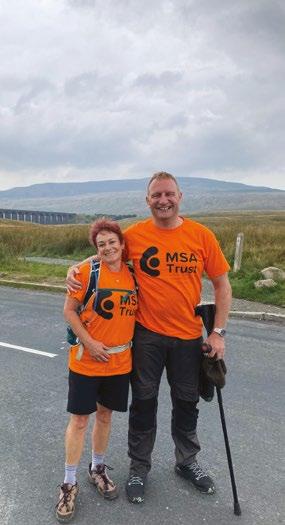
For Eve Hunter’s 16th birthday she decided to do an 11,000ft skydive in memory of her Uncle, Paul Roberts. After the jump she was joined by her family who came out to support her in their orange MSA t-shirts. “I decided to raise funds for the Trust so that they can help other families whose lives are affected by MSA, like they helped mine”. Thank you so much Eve and Happy Birthday!

Raising Awareness on the Pitch
After their dad, Paul O’Toole was diagnosed with MSA, Luke and Ben O’Toole decided to embark on a 660km cycling challenge in the hope of raising money and awareness for the Trust and St Francis Hospice Dublin. After eight long days of cycling the brothers completed their cycle ride from Mizen Head to Malin Head. “There was plenty of laughs, tears and sore arses, but we eventually made it. We expected to make €5000 but the GoFundMe page now sits at €17,495 so we are absolutely blown away by all the support we got and are so grateful”. Well done to the O’Tooles on their fantastic accomplishment.

Following the sad loss of his dad, Stephen Robinson, Mark Robinson wanted to raise awareness of MSA. As the manager of the mighty under 9s ‘Waseley Warriors FC’, Mark was able to secure sponsorship thanks to the kindness of Neil Cartwright. Mark chose to promote the MSA Trust on the front of their football shirts. The branded football kits will be worn by the team (which includes two of Stephens grandsons, pictured below) during their upcoming season in the Central Warwickshire Football League. Thank you for your support and good luck for all your matches!

FUNDRAISING STARS A ROUND UP OF YOUR LATEST FUNDRAISING STORIES
14 | msa news | Issue 66
EVE (SECOND FROM RIGHT) WITH HER FAMILY
Order your Brick to be added to our Path to a Cure…



In2019 we began building a path that leads directly to our founder Sarah Matheson’s tree in Sarah’s Wood, Sherwood Forest. The path has been built of engraved bricks carrying the names of members of our MSA community. We hope that the path symbolises hope, remembrance and togetherness. As more and more join the path, the longer, more diverse and far reaching it will become. It serves as a permanent reminder of the steps we are taking to ultimately find the cure for this devastating disease.
You can order your engraved brick on our website. To cover the cost of the brick we kindly ask for a minimum donation of £60 per engravingwww.msatrust.org.uk/path. Alternatively, call our office on 0333 323 4591 to pay by card or raise a cheque, payable to MSA Trust and send to our office.
While we accept orders for engraved bricks all year round, additions to the path can only be laid once a year. To have your brick included in our 2023 path laying, please order before Monday 6th April 2023.

All bricks ordered before the 6th April will be available to view at our Sarah’s Wood Summer Social in July, details below. To register for this event, contact fundraising@msatrust. org.uk msa news
When: Saturday 8th July 2023
Upcoming Challenge Events
Below is a selection of fundraising events you could support us with over the year. If you are interested in challenging yourself in 2023 and participating in one of these, or any other event in aid of the MSA Trust, please contact Eleanor at fundraising@msatrust.org.uk. msa news
MAY 28
Ride London 100 mile Cycle 28 The Edinburgh Running Festival
North Run 10 SEPT
Great
1 OCT 8 OCT 15 OCT
Cardiff Half Marathon
Royal Parks Half Marathon
Manchester Half Marathon
Amsterdam Marathon (Half/Full)
MAY FUNDRAISING STARS A ROUND UP OF YOUR LASTEST FUNDRAISING STORIES www.msatrust.org.uk | 15
Where: Thoresby Park, Nr. Ollerton, Newark, Nottinghamshire, NG22 9EP (main car park) Parking is £3 payable at the car park
Voice Banking Creating your Personalised Synthetic Voice
Many people living with MSA may find that their voice becomes weaker, especially when they are tired. Speech can deteriorate to a point where it becomes unintelligible which is frustrating and upsetting. Mandy Byrne, Information & Services Coordinator, looks at how voice banking can help.

SYMPTOMS CAPTURING YOUR VOICE
Whilst you may never need to use it, it can be prudent to “bank –i.e. record” your voice thus enabling you to preserve your voice identity if needed for future communication. Our member Mike has recently completed voice banking and told us:
“I liken voice banking to an insurance policy similar to that of a house or car. You hope you won’t need them but you never know. Voice banking is just like that, it’s a necessary safeguard in case the worst happens and your voice deteriorates. It’s nice to know that your voice is your voice, natural and is not generated from a computer.
I am not a computer genius, and you don’t have to be, as the setting up and downloading is easy and straightforward and quite fun to do.”
Alice Smith, CEO of SpeakUnique, explains how SpeakUnique works. When someone’s speech is affected, one option is to use ‘text-tospeech’ technology which converts a typed message into a synthetic voice, via a phone, tablet or a computer.
The MSA Trust works with SpeakUnique, to offer funding for its members to create their own personalised synthetic voicesrecognising the importance of empowering people living with MSA to live independent, fulfilled lives, and allowing them to retain their identity even when natural speech is not possible.
Creating a personalised voice through SpeakUnique is quick and easy and can be completed from your own home. All you need is a computer or laptop that is connected to the internet, a microphone (USB headset) that plugs into your computer and a quiet room. You are asked to read aloud between 150 –300 sentences (not necessarily in one go). Once you’ve submitted these, samples of your synthetic voice are available to listen to the next day.
Our member Tina recorded her
voice with SpeakUnique and says: “I hadn’t heard about voice banking until the MSA Trust recommended it to me. I thought it was a good idea, so to see if I wanted to record my voice, I started listening to other people’s versions of their synthetic voices that were provided, and I was surprised at how accurate they were.
I decided to go ahead, and was able to borrow a headset from the Trust and managed to record all the phrases in one session, it was very easy and straightforward to do. When I received my ‘synthetic voice’
I was quite shocked and a bit disappointed at first as my voice was very wobbly and I thought it didn’t sound like me at all. I recorded one of the sentences on my phone and was shocked to hear it played back as it actually did sound like my synthetic voice. I knew that my voice had changed over the last couple of years but had not realised, until I heard myself, that it had changed quite so much as it had become very shaky.
The MSA Trust funded the process which is really good so I now have the app on my phone. I have not needed to use it yet but it’s a really clever idea that I’m sure I will use a lot in the future when the time comes. I would definitely recommend getting your voice recorded.”
Jeff, who is living with MSA, recorded his voice with the help of his wife, Marion, who told us: “We found the voice banking easy to set up and do on a laptop. We recorded 300 sentences in all, but 200 would have been enough. We recorded 30 sentences at a
time so that it wasn’t too intense for Jeff. It was easy to save them and continue where you left off. We would certainly recommend doing it. We are very pleased with Jeff’s voice- it is so close to his real voice.”
SpeakUnique’s technology can “repair” speech if, at the time of recording, you have already noticed changes. Additionally, if your speech is no longer intelligible you can submit old recordings to be used to create your voice.
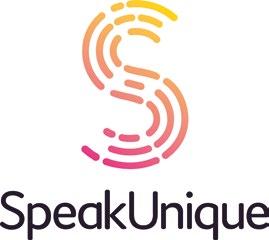
Once your voice has been generated, you can apply for funding from the MSA Trust directly through your SpeakUnique account. Our member Jason told us:
“Although I haven’t had the need to use it yet, I have completed it and downloaded it ready for use. The process couldn’t be easier and is so simple to stop and start as many times as you need. Once you’ve downloaded it you hear your voice and play around with the app.”
In addition to voice banking, message banking is an excellent way of capturing specific phrases that are more personal to you, such as a football chant, calling a pet or your laugh. These can then be added to your communication app. There is also the option of Video Banking – If you have a special event coming up, why not think about recording a special message. msa news
For more information, contact your Speech and Language Therapist or the Trust at support@msatrust.org.uk or call 0333 323 4591. Visit www.speakunique.co.uk for more information and a list of compatible devices.
www.msatrust.org.uk | 17 SYMPTOMS CAPTURING YOUR VOICE
Supporting and Helping Each Other
Technology and its various pitfalls came up at one of our recent meetings. While there are many devices out there that can be helpful, getting the wrong thing for you can be frustrating and expensive. Parkinson’s UK has an application and devices library with reviews for a variety of items. One member recommended the Beats Medical App which they discovered on the site. It provides ‘tailored daily exercises to help your mobility, speech and dexterity’. While they will not all be suitable for everyone it gives a useful guide as to what is available. Click here to find out more - www. parkinsons.org.uk/information-and-support/appsand-devices-parkinsons.
Travelling with MSA, and how to make it as smooth as possible, is also a point of discussion at many Support Groups. As a starting point, our factsheet ‘Travelling and MSA’ (www.msatrust.org.uk/support-for-you/ factsheets) has lots of useful information and also details of possible insurance companies who should be aware of MSA. Another resource is The Rough Guide to Accessible Britain which contains ideas and information about days out all over the UK and can be viewed for free online at www.motability.co.uk/news-andevents/rough-guide-to-accessible-britain
At one of our meetings for Northern Ireland and Éire members, someone mentioned that they had used ‘Ableize’ - www.ableize.com/mobility-aidsand-accessories/mobility-equipment-hire-abroad They used this to find details of companies that hire out mobility equipment including hoists, wheelchairs and scooters throughout the UK and Ireland and countries including Spain, France, Italy, USA and Greece.
Many of our members have had positive experiences with cruises. Most have arranged some sort of accessible accommodation on board and staff can be helpful in an emergency. However, no matter where you are travelling always make sure to do your own research and do not rely on website information only. If possible, speak to the provider or representative directly to explain your needs and make sure they can be met.

If notified in advance of your needs, airports and airlines should offer you assistance for the duration of your journey which can be very helpful if you have mobility problems. To save hassle at the airport one member found it helpful to send some luggage and equipment ahead of time using www.thebaggageman.com. When they arrived the bags were waiting for them in their room. If you do this just remember to pack any medication or items you would not want lost in your carry on (hand) luggage.
The most important tip if you’re thinking about booking a holiday, whether in the UK or abroad, is planning ahead as soon as possible. For a place to start, try our HealthUnlocked community (www.healthunlocked.com/msa-trust) to ask other members about their own experiences and recommendations. msa news
Nicole and James, our Support Group Facilitators, pass on some of the advice shared by members at our Support Groups, both In-Person and Digital.
out more about
18 | msa news | Issue 66
Find
our Support Group network on the following page.
Our Support Group Network
Regional In-Person Support Groups
Our In-person Support Groups meet between two and four times a year around the UK and Ireland. In many cases they are led by our great volunteers who help us provide a welcoming and supportive environment. “The group has been a wonderful resource and we have enjoyed the chance to meet others in the same boat as us. The group is small and cosy, which makes sense as it is so rare, but we learn so much from each other at the meeting.” Marge, a Carer
Regional Digital Support Groups - On Zoom
These groups link members within roughly the same region with their MSA Health Care Specialist and our Social Welfare Specialist. The format varies depending on the needs of our members but there is always a chance for questions and sharing of experiences.
Monthly Digital Coffee Mornings – On Zoom
Our Coffee Mornings are a further chance for friendly conversations with people who understand the challenges of MSA, but without our MSA Health Care Specialists. They aim to encourage conversation with other members about whatever is on people’s minds.
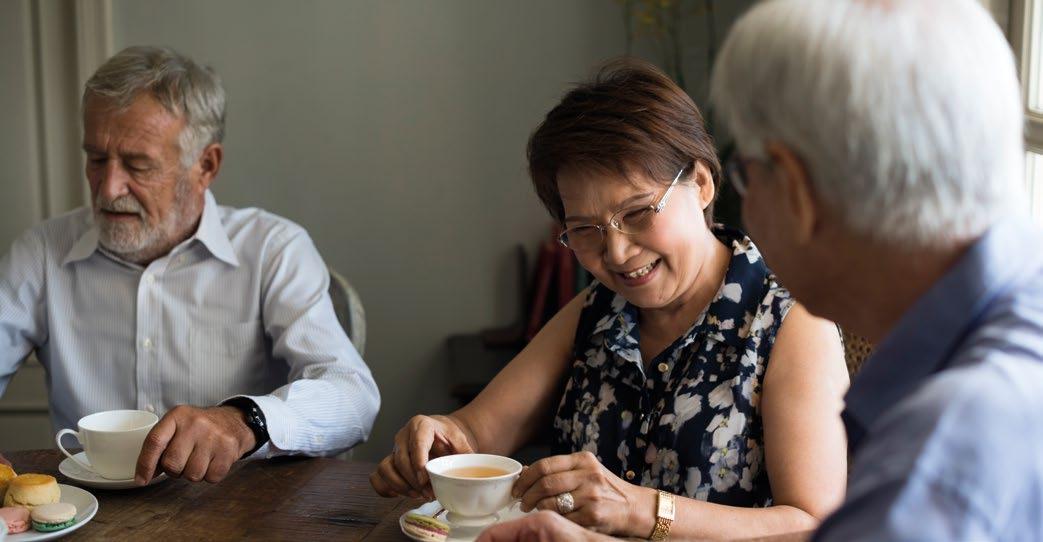
Monthly Carers Groups – On Zoom
Following feedback from our members we have recently launched a monthly Support Group specifically for Carers. This is a new resource, and we are excited to develop it further.
Introduction to MSA Q&A – On Zoom
We know that after an MSA diagnosis joining any kind of a meeting for the first time can be quite daunting. Last year, at the suggestion of some of our members we added a new resource to try and address this. Every two months we invite any new members to attend an online meeting where we show our Introduction to MSA webinar and then host a Q&A with one of our Health Care Specialists and our Social Welfare Specialist. If you would like to watch the webinar yourself it can be found here - www.msatrust.org.uk/introduction-tomsa-webinar. An anonymous member said “I found the session well organised and helpful. It made me more positive about groups on Zoom, which I had been avoiding up to now.”
If you have any questions about the above meetings, or want to be added to invitations, contact us at support@msatrust.org.uk or call us on 0333 323 4891. msa news
www.msatrust.org.uk | 19 SUPPORT FOR YOU CONNECTING WITH OTHERS
Over the last few years our Support Group offering has expanded to try and meet the different needs of our members. Read on to find out more about what is available to you.
MSA CANDLELIGHT
Thisyear we are pleased to host our memorial event, MSA Candlelight, for the first time in Northern Ireland. This will be a great opportunity for families to honour their loved ones, light a candle in their memory and enter their names into the Book of Remembrance. On the day, we will present you with a copy of the Book, give updates on MSA research and finish with afternoon tea.
To fund research into MSA and cover expenses, we are asking for a minimum donation of £12 (€15) per attendee. If you cannot attend, for the minimum donation of £12 (€15), we will include your loved one’s name in the Book of Remembrance and post it to you after the event.
To register for the event or make the donation, visit www.msatrust.org.uk/get-involved/msa-candlelight or call our office on 0333 323 4591. Alternatively, you can return the form below with your cheque (only if you are paying in Pounds as we also cannot accept cheques issued in Euros).
Date: Saturday, 13th May 2023
Time: 2 – 4pm
Venue: Hall for All, 33 Downshire Road, Newry, BT34 1EE
Name:...........................................................................................................................................................
Address:........................................................................................................................................................
Telephone:............................................. Email:........................................................................................
I would like to attend the MSA Candlelight event in Newry and enclose a donation for tickets:

Number of guests (tickets)..........................................
Donation for tickets £.................................................
Please let us know if anyone in your party has specific dietary requirements: ......................................................................................................
Additional donation for MSA research £
I cannot attend MSA Candlelight and enclose a donation to include my loved one’s name in the Book of Remembrance:
Donation for dedication £ .................................................
Total payment enclosed £
Dedication (your loved one’s name as you want it to appear in the Book of Remembrance)
Due to data requirements, please let us know how you want us to keep in touch for fundraising news and events. Please fill out your contact preferences below:
O Telephone O Post O Email........................................................................
Please make all cheques payable to ‘MSA Trust’ & return slip by 14th April 2023 to:
MSA Trust, 51 St. Olav’s Court, Lower Road, London SE16 2XB
O I prefer no contact





























